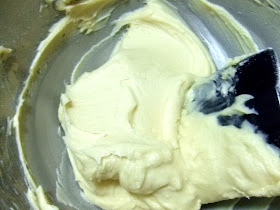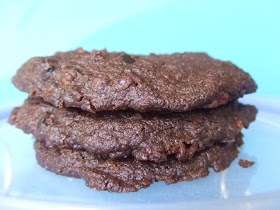
After the previous yummy
cream cheese bread , I was roaring to try out this 50% wholemeal recipe which I found on
epicurious using the newly bought organic wholemeal flour!
I attempt to make this with bare hands. Not exactly a big mistake cos I had always make my bread with some hand kneading using Dan Lepard's method. The real mistake trying to pass off my two hands as the mixer....
if you know what I mean.In Dan Lepard method, you mix all the ingredients together then let it rest for 10 min, knead for 8sec, rest for 10min etc.
In this baking session, I replace my hand knead in the instruction that says "stand mixer".... in the end, all I could recall was a shaggy untennable mess of dough which I was struggling to shag off, and in the process added 1/2 cup more of flour!
Apart from my own silliness, this is a good recipe. The instruction is so clear and detailed that you never need to stare into the humid air and wonder what's next.
********************************************
50% Whole Wheat Sandwich Bread recipe taken from
hereThis is a whole-wheat version of basic white sandwich bread. It's a little less soft but a lot more wheat-y and substantial. The use of bread flour gives this bread a lighter texture, while the milk powder and oil help soften it.
TIME SCHEDULE:
Dough starter (sponge): minimum 1 hour, maximum 4 hours (or overnight refrigerated)
Minimum rising time (including starter): about 4 hours
Oven temperature: 450°F, then 400°F
Baking time: 40 to 50 minutes
Ingredients
Sponge:
1 1/2 cups (12 ounces/336 grams) water, room temperature (70°F to 90°F)
2 tablespoons honey
1 3/4 cups (8.7 ounces/244 grams) whole-wheat flour
1/2 teaspoons instant yeast (also known as rapid-rise or bread machine yeast)
Dough:
3/4 teaspoons instant yeast
1 2/3 cups (8.7 ounces/244 grams) Gold Medal "Better for Bread" flour*
3 tablespoons non-fat dry milk powder
2 tablespoons vegetable oil
1 1/2 teaspoons fine sea salt
*If unavailable substitute 1/2 cup plus 1/3 cup (4.4 ounces/122 grams) bread flour and 1/2 cup plus 1/3 cup (4.4 ounces/122 grams) unbleached all-purpose flour.
Preparation
Make dough starter (sponge):
In bowl of stand mixer fitted with whisk attachment, whisk together water, honey, whole-wheat flour, and 1/2 teaspoon yeast until very smooth, about 3 minutes.
In medium bowl, whisk together "Better for Bread" flour, milk powder, and remaining 3/4 teaspoon yeast. Sprinkle mixture over whole-wheat flour mixture (sponge) in bowl of mixer to form blanket on top of sponge. Cover bowl tightly with plastic wrap and let stand at least 1 hour, preferably up to 4 hours. (Starter can be made ahead and refrigerated, tightly covered with plastic wrap, overnight. There is no need to bring starter to room temperature before proceeding.)
Mix dough:
Attach dough hook to stand mixer and mix starter on low (#2 on Kitchen Aid) until rough dough forms, about 1 minute. Scrape down sides of bowl, then cover tightly with plastic wrap and let dough rest 20 minutes. Add vegetable oil and mix on low until incorporated, about 30 seconds. Add salt and mix on low until dough is smooth, sticky enough to cling to fingers, and pulls away completely from bowl, about 7 minutes. If dough is not sticky, using spray bottle, spray with small amount of water and briefly knead by hand just until sticky.
First Rise:
Using vegetable oil or nonstick vegetable-oil spray, lightly oil 3-quart or larger bowl (or dough-rising container). Transfer dough to bowl and lightly oil or spray top of dough. Using tape, mark outside of bowl to approximately double current height of dough. Cover container tightly with plastic wrap and let dough rise in warm place (75°F to 80°F, see Chef's Notes) until doubled in size, 1 to 1 1/2 hours.
Using oiled dough scraper or spatula, transfer dough to lightly oiled work surface.
Gently stretch bottom of dough and fold up to center, then repeat with left side, right side, and top. Round dough package then transfer to bowl, smooth side up, and lightly oil or spray top of dough. Using tape, mark outside of bowl to approximately double current height of dough. Cover bowl tightly with plastic wrap and let dough rise in warm place until doubled in size and depression holds when pressed gently with fingertip, about 1 hour.
Shaping dough and final rise:
Transfer dough, smooth side down, to lightly floured work surface and press gently to flatten to about 1/2-inch thickness. (Dough will still be slightly sticky but use only as much flour on work surface as absolutely necessary to prevent sticking.) Lightly coat sheet of plastic wrap with vegetable oil or nonstick vegetable-oil spray. Cover dough with oiled plastic wrap and let rest 20 minutes.
Lightly coat loaf pan with vegetable oil or nonstick vegetable-oil spray. Using fingertips, dimple dough all over to eliminate air bubbles, then shape into rectangle about twice size of loaf pan. Fold right-hand-side of rectangle over to just past center, then fold left-hand-side over to meet right-hand-side. Roll down top edge of dough, using thumbs to push dough down and away from you. Continue rolling until you reach bottom then use thumbs to press and seal bottom edge. Transfer dough to prepared pan (dough should fill pan to 1/2 inch from top). Lightly coat sheet of plastic wrap with vegetable oil or nonstick vegetable-oil spray and gently cover pan with oiled wrap.
Let dough rise in warm place until highest point is about 1 1/2 inches above sides of pan and depression very slowly fills in when pressed gently with fingertip, about 1 hour. Using razor or thin sharp knife, make 1/2 inch deep lengthwise slash along top of bread.
Bake bread:
While dough is rising, position rack near bottom of oven and top with baking stone or heavy baking sheet. Set aluminum-foil-lined cast-iron pan or heavy rimmed baking pan on floor of oven and preheat oven to 450°F for 1 hour.
Using spray bottle, spray top of dough with water. Quickly transfer bread to hot baking stone (see Chef's Notes) and add 1/2 cup ice cubes to pan beneath.
Bake bread, rotating pan 180 degrees halfway through, until top is golden brown and skewer inserted in middle comes out clean (instant read thermometer inserted into center will register about 205°F), 40 to 50 minutes. Transfer bread from pan to rack to cool completely. Serve warm or at room temperature.
Chef's Notes:
- Dough rises best around 75ºF to 80ºF. If your house is on the cold side, you can set a container of very hot tap water near the rising dough and cover the dough and the hot water with a large plastic container or bowl—you will need to reheat the water every 30 to 40 minutes. Alternatively you can place the dough (and the small container of very hot water) in a microwave oven (not turned on!) or a standard oven without a pilot light, but with the oven light turned on to provide gentle heat.
- If you want to make this bread over a 2-day period, you can refrigerate it overnight after the first rise. Once it has doubled in size (first rise), gently press the dough down in the bowl, then cover with plastic wrap that has been lightly coated with vegetable oil or nonstick vegetable-oil spray and refrigerate. The next day, bring the dough to room temperature at least 1 hour before shaping and baking the loaf. Keep in mind that the time in the refrigerator replaces the second rise so there is no need for a second rise.
- For proper texture, it's important for the bread to get a blast of heat as soon as it goes into the oven. For this reason, the oven needs to be preheated for a full hour, and it's important not to let too much heat escape when you put the bread in. When transferring the dough to the oven to bake, be sure to shut the door quickly.
THE DOUGH PERCENTAGE
flour: 100%
water: 70.6%
yeast: 0.8%
salt: 1.8%
oil: 5.5%
********************************************
I baked it in my loaf pan and piped the top with my leftover cocoa buttercream to try to create the mexico bun effect.
Well, apparently NOPE :-)

The bread is quite soft... the crumbs looks close enough to the one I see on Epicurious!


 I do not have the 8" pan, so I used the 6". Ended up the cake is too tall to bake evenly. The top and side becomes too dry after sitting in the oven for more than 60min. Also, half way thru I inserted the baking core... which in turns upset the brown and green swirling:
I do not have the 8" pan, so I used the 6". Ended up the cake is too tall to bake evenly. The top and side becomes too dry after sitting in the oven for more than 60min. Also, half way thru I inserted the baking core... which in turns upset the brown and green swirling:












 Size of dough before 1st proofing
Size of dough before 1st proofing
 Some of the filling "leaked" due to the poor shaping.
Some of the filling "leaked" due to the poor shaping.


 Fortunately I brought along the chocolate frosting in a piping bag which I was able to do some quick patch up.... but no more 完美!
Fortunately I brought along the chocolate frosting in a piping bag which I was able to do some quick patch up.... but no more 完美!

























